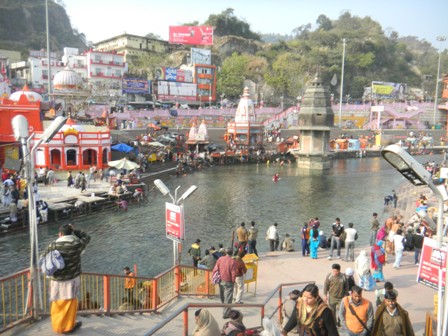Haridwar : They come here from Russia, Malaysia, Belarus, South Korea and the US, lured by Hinduism which they say answers questions that have plagued them for years.
The eclectic nature of the Hindu religion – one of the world’s oldest – has attracted foreigners from time immemorial. However, those enticed by it now are no more the dope-smoking hippy variety of the 1970s.

Foreigners flocking to Haridwar, one of the holiest Hindu holy spots, are mostly the educated, both men and women, from all parts of the globe, and have a spiritual commitment that amazes many Indians.
Moscow resident Victor Shevtsov, who at 56 looks at least a decade younger, explained why Russians like him have taken to Hinduism in such large numbers.
“Today the Orthodox Church in Russia is like the old Communist rulers,” the tour operator said. “They don’t allow questions. They don’t reply to questions. You have to obey them. This repels many.”
A fan of Indian religious philosophy, Shevtsov said in fluent English: “Many Russians are coming here because they don’t have answers (to their questions) in Orthodox Christianity.
“Here, in India and in the East, religious leaders talk to you, they answer questions.”
Fellow Russian Prokhor Bashkatov, a 37-year-old real estate agent, also blamed the Russian Church for his decision to embrace Hinduism.
“The Church is too rigid,” said the Russian who can’t understand or speak English. “It is not keeping pace with the time. I feel that my coming here is going to improve relations between Russia and India.”
Both Victor and Prokhor have close links with Gayatri Parivar, a grassroots group that is organising a mammoth event here Nov 6-10 with a view to propagating the sacred “Gayatri Mantra”.
Dmitri Kozhemyakin, in his 20s and from Belarus, has another view. He feels that the Church traditions are similar to the Vedic teachings. “And we are part of the Aryan culture too,” he added.
Like so many foreigners, Dasom Her, a 22-year-old South Korean who studies here, was floored after reading “Autobiography of a Yogi”, a gem in spiritual literature that Paramhansa Yogananda authored in 1946 and which still sells.
India, Hindu ethos and yoga had always attracted her parents, who met at a yoga class in South Korea and fell in love. When her father died, her mother decided to move to India with Dasom.
After spending time in Kolkata and Santiniketan, where she mastered Bengali, the daughter and mother moved to Haridwar where both study at the Dev Sanskriti Vishwavidyala.
“My mother decided that India is where I will learn the values of life,” said Dasom, her hands decorated with henna.
Pranav Pandya, who heads the Gayatri Parivar, says there is more than one reason why foreigners take to Hinduism.
“Meditation has done wonders,” Pandya said. “It has provided many foreigners quiet and tranquil lives. Many have accepted ‘Gayatri Mantra’ too as their own.”
The foremost mantra in Hinduism, its chanting is said to remove obstacles and increase spiritual growth. Its syllables are said to positively affect all the chakras, or energy centres, in the human body.
Do the families of foreigners accept their gravitation to the Hindu religion?
Some families are very supportive, others not so. Said Russia’s Bashkatov: “Slowly and slowly my family is accepting my interest in Hinduism.”
IANS Photo: Ravinder Makhaik



